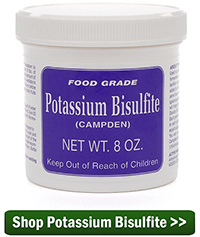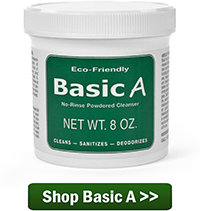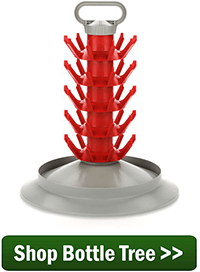 I have made a number of batches of fruit wine and consumed most of it. This is the first time I have used cherimoya in a persimmon blend. Cherimoya is a very sweet fruit, large amounts of sediment, and does not fully clear after racking it four times.
I have made a number of batches of fruit wine and consumed most of it. This is the first time I have used cherimoya in a persimmon blend. Cherimoya is a very sweet fruit, large amounts of sediment, and does not fully clear after racking it four times.
The bottled wine is stored on its side in a dark environment for 6 months. Placing a bottle on its side creates a small air bubble at the top most section of the bottle. A black spot appears on the inside of the bottle within the air bubble. Most of these black spot will merge with the wine after the bottle is turned upright for a day or so.
What is this black spot in my wine?
Name: Mark A.
State: Hawaii
—–
Hello Mark,
It’s hard to know precisely what these black spots in your wine are, but normally we associate having black spots in your wine with either a mold or bacteria growth. Combined with the fact that it is appearing where there is an air pocket in the wine bottle, I would say that it is more likely to be a growth of some sort. This is where you would typically see mold or bacteria to start to grow – next to the air.
 If you did not add a sulfite to your wine before bottling such as: Campden tablets, potassium metabisulfite or sodium metabisulfite, this would strongly add to my belief that a mold or bacteria is trying to grow in your wine. Sulfites are needed to help protect the wine from spoilage while it is in the wine bottle.
If you did not add a sulfite to your wine before bottling such as: Campden tablets, potassium metabisulfite or sodium metabisulfite, this would strongly add to my belief that a mold or bacteria is trying to grow in your wine. Sulfites are needed to help protect the wine from spoilage while it is in the wine bottle.
In addition to bottling time, you should also be using Campden tablets in the wine must before the fermentation. This is to rid the wine must from contaminates that may have come along with the fruit. The sulfites are added 24 hours before the wine yeast. Leave the the fermenter uncovered during this 24 hours to allow the sulfites to dissipate, otherwise they can interfere with the fermentation.
If you did not sanitize your wine bottles in addition to cleaning them with soapy water, this would also make me think that you are dealing with a mold or bacteria and could easily be the reason you have black spots in your wine. Cleaning the grime from the wine bottles is not good enough. They need to be sanitize with something like: Basic A or B-Brite. Any of these will easily destroy the microscopic contaminants that can grow in your wine.
If you have been doing all the above, it is still possible for a mold or bacteria to contaminate a wine and cause these black spots to form in your wine. It’s just a little harder to know how it is happening. It could be from the corks, screw-caps or whatever you are using to close the wine bottle. It could be from a piece of equipment you are using that has a nook-or-cranny that is not getting sanitized sufficiently. It could also be something as blindsiding as the sulfites you are using are old and expired. Any and all things must be considered.
After having said all this, I would like to point out that if you had said the black spots where at the lower part of the wine bottle my answer would have been completely different. I would have attributed this to tannins dropping out of the wine. This is very common and expected with some wines. But the fact that you said the black spot were next to the air pocket makes all the difference in the world.
 Any time there are black spots in your wine, there is reason for concern. At this point I would be very hesitant to drink the wine for fear of getting sick. It is possible to save the wine by putting it all back in a fermenter; add sulfites, and re-bottle. The sulfites will kill the mold or bacteria. However, I do not recommend doing this if there is any question to the smell of flavor of the wine. Adding sulfite at this point will only stop the wine from getting worse and make it safe to drink. It will not improve the wine’s flavor or aroma. So if the wine taste or smells bad now, don’t waist your time and effort. Dump it.
Any time there are black spots in your wine, there is reason for concern. At this point I would be very hesitant to drink the wine for fear of getting sick. It is possible to save the wine by putting it all back in a fermenter; add sulfites, and re-bottle. The sulfites will kill the mold or bacteria. However, I do not recommend doing this if there is any question to the smell of flavor of the wine. Adding sulfite at this point will only stop the wine from getting worse and make it safe to drink. It will not improve the wine’s flavor or aroma. So if the wine taste or smells bad now, don’t waist your time and effort. Dump it.
Best Wishes,
Ed Kraus
—–
Ed Kraus is a 3rd generation home brewer/winemaker and has been an owner of E. C. Kraus since 1999. He has been helping individuals make better wine and beer for over 25 years.
